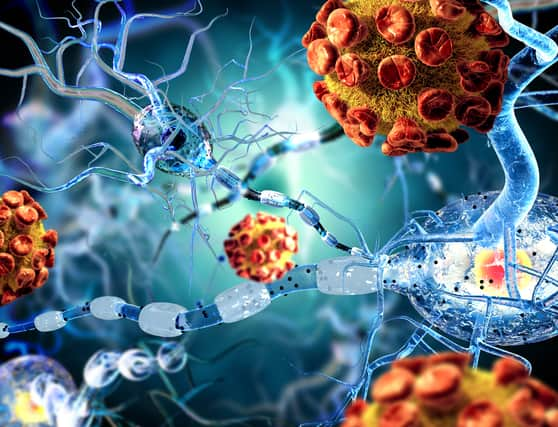Covid can cause lasting neurological effects including a stutter - everything scientists know so far
This article contains affiliate links. We may earn a small commission on items purchased through this article, but that does not affect our editorial judgement.


Covid-19 has left a number of people with neurological after-effects that include a stutter, forgetfulness and psychosis, a new US study has found.
Since the beginning of the pandemic, researchers have been examining several lasting neurological issues caused by infection of Covid-19.
Why is Covid-19 affecting the brain?
Advertisement
Hide AdAdvertisement
Hide AdOne of the key questions researchers are trying to figure out is why the brain is affected by the virus. An answer to this question will help clinicians find the correct treatments for sufferers.
Viruses can have different pathways to the brain, including infecting the body’s central nervous system. A preprint study published in May 2020 revealed clear evidence that SARS-CoV-2 (which causes Covid-19) can infect neurons. Neurons are fundamental units of the brain and nervous system.
Benedict Michael, of the University of Liverpool, who is researching biological complications linked to Covid-19, told Nature: “It seems incredibly rare that you get a viral central nervous system infection.”
Many of the after-effects seen might be the result of the body’s immune system fighting the infection. However, much more research will need to be conducted to reliably identify the exact cause.
What are some of the neurological effects of long Covid?
Advertisement
Hide AdAdvertisement
Hide AdSince the arrival of Covid-19, there has been growing evidence that coronavirus attacks the brain, and has left a number of long Covid sufferers with neurological symptoms.
A survey of 153 Covid-19 patients in the UK, and a recent preprint study in Italy of people who had been hospitalised with the disease, found that about a third had neurological symptoms of some kind.
Stutter
One of the more bizarre neurological manifestations has been a stutter. Patrick Thornton, a 40 year old Houston teacher, was among those who developed a heavy stutter after recovering from Covid-19 in August 2020.
Speaking to Scientific American, Thornton said: “I got my voice back but it broke my mouth. That was terrifying”.
Advertisement
Hide AdAdvertisement
Hide AdSoo-Eun Chang, a neurologist at the University of Michigan, is a researcher looking into stuttering. She said that herself and her colleagues have seen a rise in the number of cases of stuttering during the coronavirus pandemic.
“Speech is one of the more complex movement behaviors that humans perform,” Dr Chang explained.
“There are literally 100 muscles involved that have to coordinate on a millisecond time scale, so it’s a significant feat. And it depends on a well-functioning brain.”
Covid-19’s inflammatory response could undermine the efficiency of these circuits. What starts off as an immune effort to prevent the virus could quickly go wrong, attacking and even killing healthy tissues.
Advertisement
Hide AdAdvertisement
Hide Ad“An immune-mediated attack on synaptic connections could lead to a change in brain function,” Dr Chang added.
Thornton wasn’t the only one who developed a speech impediment after contracting Covid-19. Amanda Wood, who lives in Indianapolis, told WTHR that she developed a stutter.
Wood, who contracted the virus in March, was not feeling better by August, after suffering a stutter, intense headaches and short term recall issues.
Mental wellbeing
The effects of Covid-19 on a person's mental wellbeing are also being examined by researchers.
Advertisement
Hide AdAdvertisement
Hide AdA study published in the Lancet Psychiatry revealed that having the disease led to a greater risk of depression, anxiety and sleep disorders.
Examining 62,000 Americans who were diagnosed with Covid-19, the researchers found that, in the three months following the diagnosis, “Covid was associated with roughly twice the incidence of common psychiatric diagnoses, compared with other health conditions,” Paul Harrison of the University of Oxford said.
Harrison added that the immune response in the body provoked by the virus infection may have also had an effect on the brain, triggering psychiatric symptoms.
Other neurological effects
Other neurological effects from contracting Covid-19 are being studied by experts.
Advertisement
Hide AdAdvertisement
Hide AdResearchers from NYU Grossman School of Medicine closely monitored the progress of 6,060 Covid-19 adult patients diagnosed with brain or other nerve related conditions at four NYU Langone hospitals in New York City and Long Island.
The study was done from March to May 2020, during the peak of infections in the region.
The study found that the disease causes potentially damaging problems in about one in seven infected. The injuries range from temporary confusion due to low body oxygen levels, to stroke and seizures in the most serious cases, the authors said.
The researchers explained: “The neurological complications of Covid-19 should be taken seriously because they raise a coronavirus patient’s likelihood by 28 per cent of needing long-term or rehabilitation therapy immediately after their stay in the hospital.”
Other neurological effects found were confusion (which was caused by chemical electrolyte imbalances), severe infection or kidney failure.